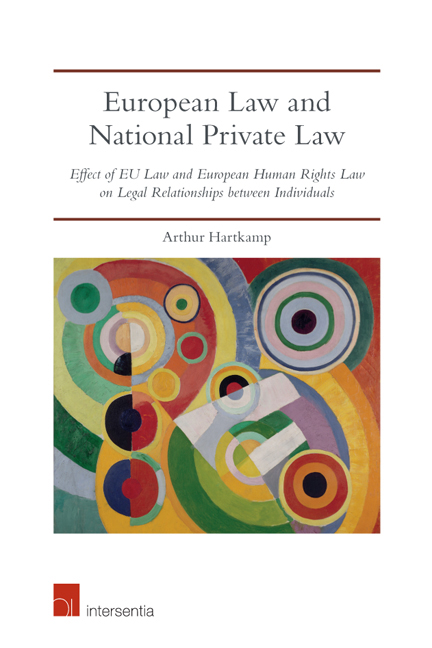 European Law and National Private Law
European Law and National Private Law Book contents
- Frontmatter
- Preface
- Contents
- Table of Cases
- Table of Legislation
- List of Abbreviations
- Part I Sources of European Law and Their Influence on National Private Law
- Chapter 1 Introductory Observations
- Chapter 2 The Tfeu and Private Law
- Chapter 3 General Principles of EU Law and Private Law
- Chapter 4 Directives and Private Law
- Chapter 5 Regulations and Private Law
- Chapter 6 Fundamental Rights and Private Law
- Part II Overview of Directives and Scholarly Projects in General Private Law
- Bibliography
- Index
Chapter 6 - Fundamental Rights and Private Law
from Part I - Sources of European Law and Their Influence on National Private Law
Published online by Cambridge University Press: 22 September 2018
- Frontmatter
- Preface
- Contents
- Table of Cases
- Table of Legislation
- List of Abbreviations
- Part I Sources of European Law and Their Influence on National Private Law
- Chapter 1 Introductory Observations
- Chapter 2 The Tfeu and Private Law
- Chapter 3 General Principles of EU Law and Private Law
- Chapter 4 Directives and Private Law
- Chapter 5 Regulations and Private Law
- Chapter 6 Fundamental Rights and Private Law
- Part II Overview of Directives and Scholarly Projects in General Private Law
- Bibliography
- Index
Summary
INTRODUCTORY OBSERVATIONS
THE ECHR AND THE ECtHR
This chapter will first deal with the protection of fundamental rights provided by the European Convention on Human Rights and Fundamental Freedoms (ECHR)in particular its importance for private law. The development of the protection of fundamental rights within the European Union and its relevance for private law will be discussed in section 4 of the chapter (no. 231a below). In 1950, in Rome and under the auspices of the Council of Europe that was established in 1949, the ECHR was made. The contracting parties secure to everyone within their jurisdiction the rights and freedoms defined in the Convention and in the protocols that have subsequently been added. The ultimate review of compliance with this obligation is vested in the European Court of Human Rights (ECtHR), which is established in Strasbourg. On a relatively modest but increasing scale, the ECHR is also relevant in the field of general private law.
The rights which the ECHR ensures will be respected by the authorities are a number of traditional human rights, e.g. the right to life, the right to be protected from torture and slavery, the right to liberty and security, the right to a fair trial, the right to respect for private life, and the right to freedom of religion, expression and assembly. In practice, most of the rights are relevant to criminal law: approximately two-thirds of the cases decided in Strasbourg relate to criminal law. With regard to private law cases the ECHR is mainly relevant to the law of persons and family law, and the law of civil procedure. However, some of the rights protected by the Convention are indirectly also relevant to general private law (the law of property, contract and unlawful acts), for example Article 6 ECHR (right to a fair trial) and Article 8 ECHR (right to respect for private life). More important, because directly relevant, is Article 1, Protocol No. 1, which pertains to the right to own property. In the following I will mention examples from the case law of the European Court of Human Rights relating to these articles.
The observance of the engagements undertaken by the contracting states is ensured by the European Court for Human Rights in Strasbourg (ECtHR).
- Type
- Chapter
- Information
- European Law and National Private LawEffect of EU Law and European Human Rights Law on Legal Relationships between Individuals, pp. 173 - 208Publisher: IntersentiaPrint publication year: 2016


